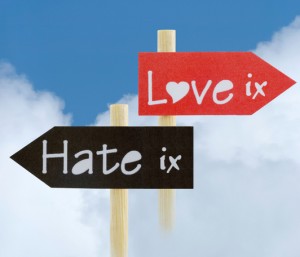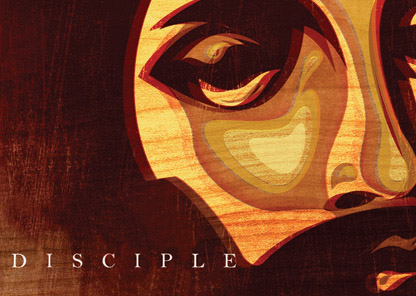Luke 14:26
It would be so much easier this morning if we were listening to Matthew’s Gospel, wouldn’t it? The Gospel where Jesus, pretty much in the same setting, says, “Whoever loves father or mother more than me is not worthy of me; and whoever loves son or daughter more than me is not worthy of me”?
But we don’t have Matthew this morning, with its emphasis on love. No, we have Luke. And in Luke’s Gospel, Jesus is not as gentle, not as nuanced, not as loving.
For in Luke’s Gospel, Jesus says: “Whoever comes to me and does not hate father and mother, wife and children, brothers and sisters, yes, and even life itself, cannot be my disciple.”
Whoever … does not hate …
At best, when we hear Jesus say this, we cringe. At worst, we ignore him. Because hate is not something that we associate with Jesus.
When I work with children and youth, I always stop them from using the word hate. You know how kids can be: I hate … broccoli. Or I hate my teacher … or that TV show … or that song. Kids use the word hate all the time. And when they do, I stop them. “You can’t use that word,” I tell them. “Jesus doesn’t tell us to hate things, so you can’t hate. You can despise. You can even severely despise. But you cannot hate. God did not create us to hate. God created us in love to love,” I tell them.
Which is true.
We are created in God’s image, and that image is, first of all, one of love. We know that because we are not necessary to God. God is necessary to us, but we are not necessary to God. And we know that because God was before we were, and God will be after we are, so therefore we simply cannot be necessary to God. So God must have created us because God wanted us, God desired us. Which means God created us out of God’s love for us.
Which is why we simply can’t go around hating things, hating ideas, hating people. It simply is not how or why we were created.
But then we come to Luke’s version of Jesus’ saying, where Jesus is not gentle, not nuanced, not loving.
Jesus has just finished dining with a leader of the Pharisees, has just finished instructing the people to take the lower seat at the table, to feed the poor, the lame, the blind, the sick. Now he turns his back on that town and begins traveling, with “a large crowd following him.” And suddenly he turns to them and out of the blue says:
“Whoever comes to me and does not hate father and mother, wife and children, brothers and sisters, yes, and even life itself, cannot be my disciple.”
What brought this on? Where did this come from?
Well, I’ll tell you: I think Jesus has had it.
I think he’s tired of explaining to people – high and low – what it means to be a disciple.
I think he’s tired of having large crowds follow him, without making any commitments.
I think Jesus knows that far too many people in the crowd were just along for the ride, wanting to see what would happen next with this young, itinerant rabbi from Nazareth who preached a radical message of God’s love and hospitality.
Remember, these are people who have been waiting for a Messiah for centuries. They wanted another David. They wanted Israel and Judah restored. They wanted the Romans out, their glory restored, their freedom back. Not that they were planning on doing anything about it. That’s simply what they wanted. So when Jesus showed up in their neighborhood, they followed him, just in case anything happened.
And I think, by this point in his ministry, Jesus has had it. He’s fed up with the freeloaders.
So he lays it on the line for them:
The only way to be my disciple is to hate everything else.
Now, to be clear, the way Luke uses the word hate is somewhat … slightly … different from the way we use that same word these days. And here I’m not talking about how some people use the word hate, like the kids in Youth groups do when they say they hate broccoli, or that TV show, or that song.
I’m talking about the kind of hate that is visceral, and emotional, and comes deep anger … the kind of hate that is the result of irrational fear … the kind of hate that nine years ago this Saturday flew into the Twin Towers in New York, slammed into the Pentagon, and brought down a plane in the Pennsylvania countryside, killing nearly 3,000 people … the kind of hate that tears apart the lives of people all over the world today: Israelis and Palestinians, Afghans and Taliban, Shi’a and Sunni Iraqis, Sudanese Arabs and Sudanese blacks … the kind of hate that is used to threaten people of faith here and around the world …
That is not the “hate” that Luke is describing in today’s Gospel. What Luke is talking is the disruption of the family in first-century terms. Hate here means disconnecting from everything that has previously defined a person: family, friends, genetics … As one commentator describes it, when Jesus says to hate your family, he means to turn your back on the old ways of life, the old world as people in those days understood it, so that the new ways, the “new world of God,” can come into being.
So, you see, Jesus looked back and he saw all those hangers-on, all those free-loaders who were just along for the ride, who were following him to see what would happen next, but who would do nothing to make that next thing happen … he saw them, and he cut loose.
If you want to follow me, he said, be prepared. Following me is not easy. It comes with a cost. You want to be my disciple?You want to love God with all your heart and mind and soul and strength? You’re going to have to give up something. In fact, you’re going to have to give up a lot. Your family – which doesn’t want you to follow me. Your friends – who’d really rather have you come out and play with them. Your place in society … perhaps your job … your home … 
Because nothing – nothing! Jesus says – can come between you and God.
That’s what it means to follow me.
Not just traipsing across the countryside, waiting to see what happens next. Not just showing up when I preach, or coming to me when your need is great and you want to be healed.
No. You want to be one of my disciples? Jesus says.
Put God first. Every moment. Every day. In everything you do.
Jesus is being very clear: We are not created to be freeloaders in our faith. We are not created to simply follow along, so that we can see what happens next.
We are created to make the next thing happen.
We who are created in God’s image, out of God’s love, are the ones who are called to love in return. To feed the hungry and care for those in need … not “God on high,” not the “other guy around the corner” but us. It is up to us to make the next thing happen through our love … like your food pantry yesterday … and the Stop Hunger Now program this coming Saturday … and the FISH clothing bank this whole month.
We are the ones who are called to see the world’s needs about us, and do something about it, to change it … like this discussion that you are having about the possibility of nursery school here for that 40 percent of the children in this county who never have a chance to go to preschool.
This is what it means to be a disciple of Christ: We have to turn our backs on everything old, everything that defines us by society’s limited and often self-serving standards, so that everything new, everything that is God, can come into being.
And the only way that is going to happen is if we refuse to be the hangers-on and the freeloaders, just along for the ride, and instead actively decide to put God first … in every moment and every part of our lives.
Jesus is stunningly clear: Discipleship is not easy. Discipleship is not cheap. Being a disciple means that we have to be brave and stand up for what God wants, regardless of what society tells us.
And it means that sometimes, yes, we are going to have to hate, just as Jesus said – not in the visceral, evil way that we encounter so much in today’s world, but in the back-turning, decision-making, world-changing, radical way of which Jesus speaks in Luke’s Gospel.
Because that is the only way we can change the world.
Amen.
A sermon preached on the 15th Sunday after Pentecost, Proper 18, Year C, by The Rev. Lauren R. Stanley at Christ Church, Millwood, Va.




